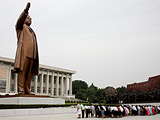Coming of Age in North Korea
By Graham Ong-Webb for ISN
Earlier this year, South Korea’s military intelligence external pagewarnedcall_made of the threat of human-torpedo attacks from the Democratic People's Republic of Korea (DPRK). They conjectured that Pyongyang was planning to avenge its defeat in a external pageskirmishcall_made between the North and South Korean navies along the disputed maritime border, known as the Northern Limit Line, in November last year.
Revenge may very well be part of the North’s motive for the latest attack. However, like its external pagelaunch of a long-range dual-use rocket in April last year,call_made the attack on the Cheonan is about more than rancor and retribution in the North’s treatment of the South: It is also the product of the power dynamics within the North Korean government, and it is almost certainly has to do with the issue of leadership.
The attack very likely heralds the coming succession of Supreme Leader Kim Jong-Il’s third and youngest son, Jong-un, as the prospective head of state of North Korea.
From what appears to be an entrenched political dynasty, it is easy to assume that the transition of power between the Supreme Leader and whoever he chooses to succeed him is going to be a straightforward affair. Instead, the transition of power in North Korea will turn out to be turbulent if Kim Jong-Il does not manage the matter cleverly.
The general problem is that the all-pervasive cult of personalities created by the founder of the DPRK, Eternal President Kim Il-sung (who passed away in 1994), and now the Supreme Leader, has threatened the future reign of the Kim family.
The key problem is that both the Eternal President and the Supreme Leader have failed to institutionalize a concrete mechanism of succession. This lack of long-term planning is unsurprising since the cult of personality is centered upon a single individual at any one time. Both Kims are also likely to have bought into their own hype about their immortality.
If there is any ‘mechanism’ to speak of, the Eternal President approach to succession sets a dangerous precedent for the Supreme Leader. Kim Il-sung subjected his son to a external pagetwo-decade climb to the topcall_made from the time he was introduced into the political sphere as heir apparent around 1971 to the time he assumed the position of president in 1993.
Jong-un cannot afford such a lengthy climb because the North Korea of today is not the country it was between the 1970s and the 1990s. Through ideological dogmatism and sheer mismanagement, North Korea is in such a poor economic state that its collapse is expected to be imminent.
As it is, North Korea’s disastrous currency revaluation earlier this year, which triggered social unrest and threatens to cause another famine, is external pagereportedcall_made to have affected the succession.
Jong-un rise to power must be meteoric because North Korea’s external pagemilitary generalscall_made are rapidly accruing more power relative to the politicians in Pyongyang under the Supreme Leader’s patronage. This shift in power is occurring through the National Defence Commission (NDC), which is described as “the highest guiding organ of the military and the managing organ of military matters.”
Jong-Il is the Chairman of the NDC and technically wields absolute control over the entire North Korean military apparatus. Jong-un also sits on the NDC but he currently holds a mid-level position.
The challenge for Jong-Il is to close the gap between Jong-un and himself in a timely and efficient manner without undermining internal stability, his present cult of personality and Juche ideology.
It is very likely that the Supreme Leader is trying to rub some of his cult status onto his chosen heir apparent. According to the latest South Korean news external pagereportcall_made, Kim Jong-Il visited the North Korean Navy Command with Jong-un to raise troop morale at the end of last December after the humiliating skirmish in November. Jong-Il was said to have pressed the navy for revenge.
In return, the North Korean Navy Command sat down to plan the Cheonan attack around 8 January 2010, apparently the date of Jong-un’s 27th birthday.
Because the attack was successful, further credit can at least be accorded to Jong-un for his fortuity. However, Jong-Il is likely to credit his son for the idea of the attack as well as the North’s spate of belligerent acts in recent years.
According to his own external pagebiographycall_made, Jong-Il was quickly nicknamed ‘intelligent leader’ when he was a young princeling. Re-creating Jong-un’s cult of personality in the image of his father makes perfect sense.
At the end of the day, there may simply not be time. external pageJong-Il’s healthcall_made is rapidly deteriorating. His sudden death would lead to a power grab among the generals, a paralysed government and the possible collapse of the entire system.
While Jong-un may be coming of age, the North Korean ship of state may sink sooner than he can take the helm.

